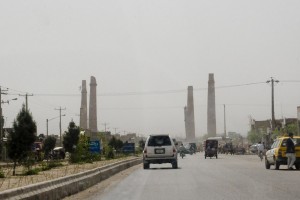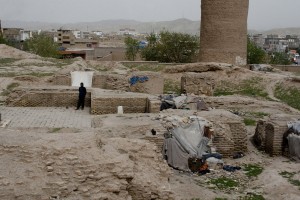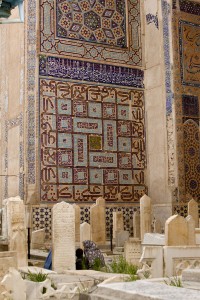women
Newer Entries »Herat part 1
Thursday, March 25th, 2010
Just back from a short trip to Herat, an ancient cultural center located on the Harīrūd river in western Afghanistan. First settled five thousand years ago, Herat has always been regarded as the cradle of Afghan civilization, Like in Egypt, as one flies over sandy wastelands, a straight line changes the landscape to one of irrigated green fields and trees.
Shakila, the woman who visited us last summer invited me to spend the Now Ruz (New Year) holiday with her old friend from nursing school, Soleha, her husband Ali, and their 4 year old daughter, Munis. They live in a nice apartment with gorgeous pink marble stairs, two bedrooms, a “squat and squirt” toilet and no internet. Soleha has become a midwife and has opened her own midwife clinic/pharmacy. (One item she sells at the pharmacy is Happiness brand Depo Prevara.) She cares for her family during the day until 4pm when she opens her clinic. Assistants at the clinic watch Munis while she works. The day Shakila and I visited, she had a non-stop flow of patients for pre-natal care, birth control, gyn issues and post-partum check ups. Lab work takes weeks to return and she doesn’t do routine pap smears. She says that the women prefer her to a doctor because she takes the time to listen to them and if she doesn’t know something, she works hard to find out.
The following day we went touring around. The mosque and seminary complex completed by Queen Gowhar Shad in 1418 is now rubble with only five towering pillars remaining. Among the dirt hillocks and low mud brick walls remaining, heroin addicts have fashioned huts out of rubble.
Gazar Gah is the burial place of Ansari of Herat, a renowned and well-loved Sufi poet who died in 1088.
Here is one of his poems:
Give Me
 |
by Khwaja Abdullah Ansari (1006 – 1088) TimelineEnglish version by Andrew Harvey Original Language |
|
O Lord, give me a heart
I can pour out in thanksgiving.
Give me life
So I can spend it
Working for the salvation of the world.
Inside this shrine and others also offer an oasis where women can gather to visit with each other in this conservative city where there are few places for women to “hang out” in public.
Next we visited the Haji Galton Wali shrine, also known as the shrine of the “Rolling Saint”. When I visited here in ’03, it was full of men and I was told to come back on a “women’s day”, which I couldn’t do. This day there were only a few people, so I took the opportunity to give it a try. My attitude was that I don’t believe in it, but I don’t disbelieve, either. I lay my head on a stone for that purpose, crossed my ankles, made a wish and the shrine-lady there gave me a push to start me rolling. It didn’t really work. The few rolls I did took effort. I took that to mean that I wasn’t going to get my wish. I changed wishes and this time once I got started, it felt as though I were rolling down a gentle hill. I came to a stop in the middle of the “yard” and wondered if I could roll more so I tried to continue to roll under my own effort. This time it was hard, not natural like the rolling was earlier.
Posted in Afghan Women's Project, AWP 2010, women | Comments Off on Herat part 1
Business Student Interviews
Thursday, March 18th, 2010
My head is swimming from transcribing the interviews of four students of the IEEW. (The Institute for Economic Empowerment of Women, www.ieew.org)
When I listened to Rahela describe her yard-long list of activities that she had done over the years to provide education, health and employment services for women, I was wondering what anyone in the West would have to teach her. What she (and others) appreciate about what IEEW and other business training organizations have to teach are the mechanics of organization, writing business plans, self-promotion, “wayward employee” management and things like these which aren’t part of Afghan culture.
Throughout all of the interviews I’ve done with these women and others, there is the common theme that they are who and what they are because of the support they got from their families. And they feel a need to pay it back. Farghana says that her dream for herself is to be an internationally known successful businesswoman, but also “I would be a woman who will take her family along with herself. I know my power,… but I think that my family is my backbone”.
Sometimes they had to fight for that support and prove themselves, like Miriam, a photojournalist, whose father wouldn’t let her travel to Herat with a female foreign colleague. She “worked on him” for awhile until he got used to that idea and later the idea of her living alone in another town on another assignment, then to take a photo course in India, and etc. etc. At this point, when she’s not home by 9 PM, (which is generally unacceptable for women in Afghanistan) he will call her to make sure she’s safe, but he trusts that she’s doing important work. It helps that she’s bringing in a good income.
What finally convinced him is that she told him that when she’s out photographing, interviewing and interpreting, no one sees her as a woman, that they see her as a man because of the way she acts and talks. Really, these fathers are taking a big chance in a society where even rumors of their daughter’s unacceptable behavior can land the woman and by extension their families in serious trouble, if not even prison. I’m seeing that often this “trouble” comes from conservative relatives.
And it’s not only the fathers. Those who are married, must necessarily have accepting and supportive husbands, and not always pertaining to the women bringing in an income. When Sakina and her friends organized the demonstration against the Shia Family Law (in the West more famously known as the Hazara Marital Rape Law), “my family supported me. Especially my husband, because we are like friends.”
Another benefit of that demonstration for her and her friends was the example of how powerful women working together can be. There are many cases of women doing things and creating organizations to help those less fortunate, but many who participated, felt as Sakina did, that “when we make contact with another woman and share ideas and our skills, we can improve ourselves.”
Posted in Afghan Women's Project, AWP 2010, education, women | 1 Comment »
Upcoming interviews
Sunday, March 7th, 2010
There is so much going on and so much to say, but when I get home at night, I’m exhausted. The Global Exchange tour will be over soon and I’ll have more time to write. Soon I’ll be interviewing the top Afghan woman general, a videographer who works for Tolo TV, a woman basketball player who once played in Washington DC, some orphan girl scouts and lots more. I’m excited! The lack of rain today is a definite blessing for me, but I don’t understand how they can have muddy streets and, at the same time, so much dust in the air. Downtown, people are starting to wear dust masks to protect themselves.
Posted in Afghan Women's Project, AWP 2010, Other, women | Comments Off on Upcoming interviews
Less than a month till I leave
Wednesday, February 3rd, 2010
And when I go, I’d like to take small (4 mp+) cameras to give to RAWA to help them document human rights abuses against women. If you got a new camera over the holidays and would like to put your old one to good use, leave me a message or send an email and I’ll tell you where to send it.
Afghan women thank you.
Posted in Afghan Women's Project, AWP 2010, education, women | 1 Comment »
Um Khalid
Sunday, June 10th, 2007
Um Khalid has an ideal situation for an Iraqi refugee. She’s an engineer working in the private sector who’s married to a Jordanian Sunni. She had a satisfying life living in Amman, Jordan that was quite balanced between caring for her kids and working in their family “water purification device” business. However, as prices got higher in Jordan following “The Kuwait War” and her longing for her homeland got more intense, her family moved to Baghdad. Even during the sanctions, they did well economically since they had their own company. Those who were working for the government at that time had their salaries reduced to a pittance, which of course led to widespread corruption. Read more »
Posted in Iraq, Iraqi Refugee Women's Project, Iraqi women, women | 1 Comment »





